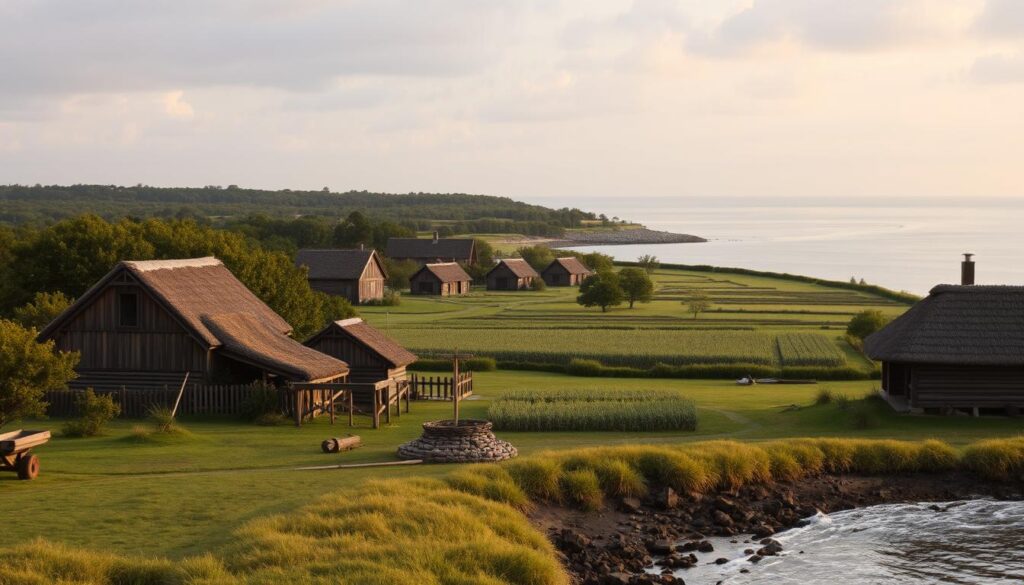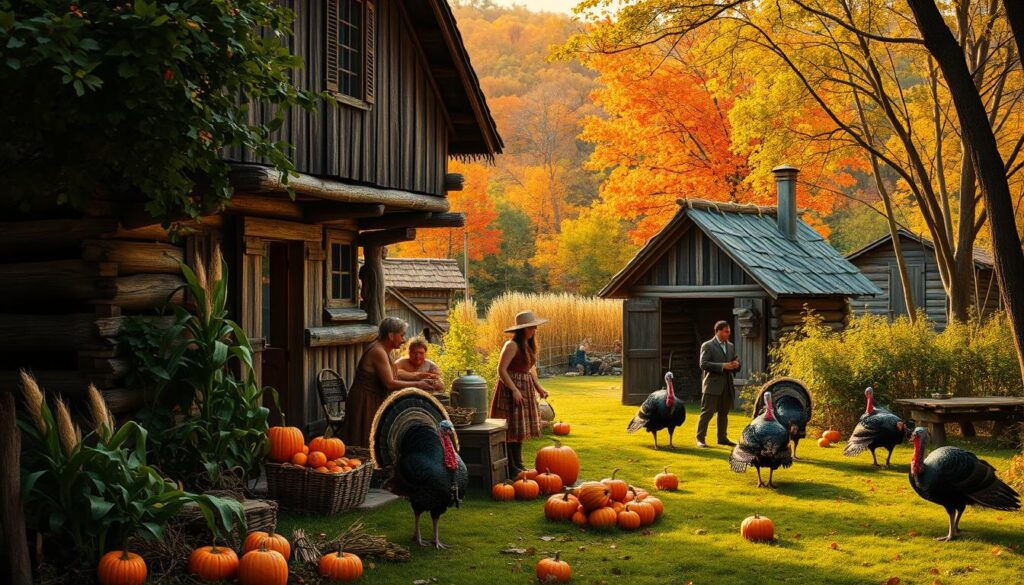In 1620, 102 Pilgrims set sail from England on the Mayflower. They faced a 66-day journey across the Atlantic. Their goal was to find religious freedom in the New World.
After reaching the coast of Massachusetts, they were ready to start a new life. They aimed to build a society based on their faith.
The Pilgrims’ arrival started Plymouth Colony. This settlement was key in early American history. They faced many challenges, including a harsh first winter that killed half of them.
Despite these difficulties, they formed an alliance with the Wampanoag tribe. This alliance helped them build a thriving community.
The Pilgrims also created the Mayflower Compact. This document, signed by 41 men, was a major achievement. It established self-governance and set the stage for American democracy.
Key Takeaways
- In 1620, 102 Pilgrims aboard the Mayflower made a perilous 66-day journey from England to America, establishing the Plymouth Colony in present-day Massachusetts.
- The Mayflower Compact, signed by 41 Pilgrims, became a foundational governance document that laid the groundwork for self-governance and democratic principles in colonial America.
- Despite facing numerous challenges, including a harsh first winter that claimed the lives of half the Pilgrims, the colony managed to forge an alliance with the Wampanoag tribe and lay the foundation for a thriving community.
- The Pilgrims’ journey and the establishment of Plymouth Colony played a crucial role in shaping the early history of the United States, paving the way for future colonial settlements and the development of American democracy.
- The Pilgrims’ quest for religious freedom and their enduring legacy continue to be celebrated in the annual Thanksgiving tradition, which traces its origins to the first harvest celebration in 1621.
The Mayflower’s Perilous Voyage
In 1620, a group of Puritan separatists, known as the Pilgrims, set sail on the Mayflower. They were fleeing religious persecution in England. Their goal was to find a new life in the New England colonies.
Separatists Flee Religious Persecution
The Pilgrims were a sect of Puritans who left the Church of England. They faced a lot of religious intolerance and discrimination. So, they decided to leave England and sail to the Plymouth Colony in Massachusetts.
Perils of the Atlantic Crossing
The Mayflower voyage was very dangerous. The Pilgrims faced storms, seasickness, and disease for 66 days. But they were determined to reach the New World and start the Plymouth Colony.
“The sea was so angry that none could stand upright, and we lay as if dead, for many had thrown up all they had eaten.”
The Mayflower’s journey was a key moment in the Pilgrims’ history. They overcame religious persecution and the dangers of the sea. Their journey helped start the New England colonies and left a lasting legacy.
Arrival at Cape Cod
The Mayflower finally reached the shores of Cape Cod in present-day Massachusetts after a long and dangerous journey. The Pilgrims, seeking religious freedom, had faced many challenges on their way.
As the Mayflower neared the New England coast, the Pilgrims saw the rugged land for the first time. The sight of windswept dunes and towering cliffs must have been both thrilling and scary for them.
The Pilgrims quickly set out to explore their new home. They sent scouting parties to map the coastline and find the best place to settle. They were attracted to the sheltered harbor and fertile soil, believing it would help their colony thrive.
After thinking it over, the Pilgrims chose to settle in what is now Plymouth Colony. This made them the first permanent English colony in New England. Their decision was a key step in the growth of the Plymouth Colony and the early settlements of colonial history in Massachusetts.
The Mayflower Compact: A Landmark Agreement
When the Pilgrims arrived in the New World, they had to figure out how to govern themselves. They created the Mayflower Compact, a key agreement. It helped shape the Plymouth Colony and set the stage for democracy in Colonial America.
Establishing Self-Governance
The Pilgrims wrote and signed the Mayflower Compact before landing in the New England colonies. It set up a system for making laws and decisions democratically in their new home.
Principles of Democracy
The Mayflower Compact marked a crucial moment in colonial America. It established the core of democratic values that would shape the nation. It gave the Pilgrims the power to govern themselves, highlighting the value of individual rights and collective decision-making.
This agreement’s focus on self-governance and democracy inspired the Puritan migration and other New England colonies. It played a big role in shaping the political and social landscape of the United States.
1620 – Pilgrims Arrive on the Mayflower and Establish Plymouth Colony
In 1620, a major event changed colonial America forever. The Pilgrims, seeking religious freedom, landed in what is now Massachusetts. They started the Plymouth Colony, setting the stage for the United States.
The Pilgrims left England on the Mayflower, a ship with 102 passengers and a crew. They braved the Atlantic Ocean to reach New England. There, they faced the challenge of building a new life in the Plymouth Colony.
Despite many obstacles, the Pilgrims kept going. They laid the foundation for the Massachusetts colony and New England. Their arrival in 1620 was a key moment in colonial history, leading to the United States.
| Key Events of 1620 | Significance |
|---|---|
| Mayflower Voyage | The Pilgrims’ perilous journey from England to the shores of New England |
| Establishment of Plymouth Colony | The Pilgrims’ settlement, which would later become a crucial part of American colonial history |
| Signing of the Mayflower Compact | A landmark agreement that established self-governance and democratic principles |
The Pilgrims’ arrival in 1620 and the founding of the Plymouth Colony were key moments in American history. These events still inspire people today. They show the Pilgrims’ resilience, determination, and values that shape the American spirit.
Settling at Plymouth Rock
The Pilgrims arrived at Plymouth Rock in Massachusetts after a long journey across the Atlantic. This rugged land was their new home, a big change from England. They had left behind the comforts they knew.
Challenges of the New World
The Pilgrims faced many challenges in the New England climate. The cold winters, unfamiliar land, and lack of farming skills made life hard. They also worried about wild animals and Native American tribes.
But the Pilgrims were strong and determined. They worked hard to build homes, farm the land, and make friends with the Wampanoag people. These friends were key to their survival.
| Challenge | Description |
|---|---|
| Harsh Climate | The cold winters of New England were a big threat to the Pilgrims’ health. |
| Unfamiliar Terrain | The Plymouth Colony’s rocky, forested land was very different from England. The Pilgrims had to learn new farming and hunting ways. |
| Lack of Agricultural Knowledge | The Pilgrims didn’t know much about farming in the New World. This made it hard to grow food. |
| Wilderness Threats | The Pilgrims worried about wild animals and the unknown dangers from Native American tribes. |
Despite the tough challenges, the Pilgrims’ strength and determination helped them start the Plymouth Colony. This was a key moment in colonial history of Massachusetts and the early settlements of New England.
The Harsh First Winter
The Pilgrims faced a tough first winter in the Plymouth Colony. They arrived in a harsh New England climate, not ready for the cold. They struggled to build their new home, facing many challenges.
The lack of good shelter, food, and medical care was hard on the colony. Many Pilgrims died from disease, hunger, and cold. More than half of the original settlers died that winter.
“The sickness had so weakened us, as scarce any of us could either go or well stand, there being in some places of the plantation scarce the living to bury the dead.” – William Bradford, Governor of Plymouth Colony
The Pilgrims showed great strength during this hard time. Their hard work and determination helped the Plymouth Colony grow. They paved the way for success in New England.
| Challenges Faced | Impact on the Colony |
|---|---|
| Lack of adequate shelter | Exposure to the elements, leading to illness and death |
| Scarcity of food | Malnutrition and starvation, contributing to high mortality rates |
| Limited medical resources | Inability to effectively treat the sick and injured |
The Pilgrims’ strength during the harsh first winter shaped colonial history. Their fight to survive and thrive in the New World left a lasting legacy. The Plymouth Colony’s story began with their courage and perseverance.
Encounters with the Wampanoag Tribe
When the Pilgrims arrived in Plymouth Colony, Massachusetts, they met the Wampanoag tribe. This meeting was a key moment in early American history.
Squanto’s Crucial Role
Squanto, a Wampanoag, was very important. He had been taken to England before returning. He helped the Pilgrims and the Wampanoag understand each other.
Forging Alliances
Thanks to Squanto, the Pilgrims and the Wampanoag formed an alliance. The Wampanoag, led by Massasoit, helped the Pilgrims a lot. They taught them how to farm and survive.
This partnership wasn’t easy, but it helped create the first Thanksgiving. It’s now a beloved American tradition.
The First Thanksgiving Celebration
In 1620, the Pilgrims arrived in what is now Massachusetts on the Mayflower. They started the Plymouth Colony, beginning a new chapter in colonial history. The first year was tough, but they got help from the Wampanoag tribe, led by Squanto.
The Pilgrims and the Wampanoag came together in 1621 to celebrate. This event, now called the First Thanksgiving, showed unity and cooperation between them.
The feast was full of food. The Pilgrims brought wild turkey, venison, and game. The Wampanoag brought fish, lobster, and vegetables. It showed how the Pilgrims adapted to the new England wilderness with help from the Native Americans.
This first Thanksgiving started a tradition that lasted for centuries. It became a key part of American culture, showing the nation’s unity and shared success. The First Thanksgiving still brings people together in the United States today.
The First Thanksgiving was a key moment in Plymouth Colony and United States history. It showed the Pilgrims and Wampanoag’s resilience and cooperation. It also started the Thanksgiving tradition we love today.
Building the Plymouth Plantation
The Puritan settlers of the Plymouth Plantation in Massachusetts worked hard to build a new home in New England. They aimed to create a community that showed their strong Puritan values and way of life. Their story is a great example of their resilience and determination.
Puritan Values and Way of Life
The Puritans who started the Plymouth Plantation were very dedicated to their faith. They wanted to make a society that followed their strict moral and spiritual rules. Their lives were all about the church, education, hard work, and following a strict code of conduct.
- The Puritans believed in predestination, the idea that God had already decided their fate.
- They valued self-discipline, being frugal, and living a virtuous life.
- Education was very important to them. They set up schools and colleges to teach their children about their faith.
- Their community was close-knit. They had a strong sense of responsibility for each other and helped one another in need.
The Puritans of the Plymouth Plantation worked hard to build a thriving community. Their dedication to their beliefs and teamwork helped them create a model for colonial history in New England.

“We are the Puritans, the people of God, and we have come to this new land to build a society that reflects our highest ideals.”
Pilgrims’ Legacy in American History
The Pilgrims’ journey and the Plymouth Colony’s founding deeply influenced American history. Their story is a key part of the nation’s culture. It shaped the United States and its traditions.
In 1620, the Pilgrims arrived in Massachusetts and settled at Plymouth Rock. Their hard work and determination helped create the country’s core values and democratic principles.
The Mayflower Compact shows their commitment to self-governance and representative government. This agreement helped lay the foundation for the U.S. Constitution’s democratic ideals.
Thanksgiving celebrates the Pilgrims’ first harvest and the Wampanoag tribe’s help. It’s a national holiday that honors gratitude, community, and cooperation.
The Pilgrims’ story still inspires Americans today. It has led to many works of art, literature, and historical re-enactments. Their courage and faith in the face of challenges make them symbols of early American history.
Today, the Pilgrims’ legacy lives on in American ideals like democracy and religious freedom. Their journey and the Plymouth Colony’s founding show the American spirit of exploration and the pursuit of a better life.
Religious Freedom and Democracy
The Pilgrims arrived in Plymouth Colony in 1620, marking a key moment in Colonial America’s history. Their quest for religious freedom and the Mayflower Compact’s democratic principles deeply influenced New England and the United States.
Influence on Colonial America
The Pilgrims sought religious freedom, fleeing England’s persecution. They aimed to build a community where they could practice their Puritan faith freely. This commitment to religious liberty became a key part of their legacy and a fundamental principle in the American colonies.
The Mayflower Compact, signed upon arrival, introduced self-governance and democratic decision-making. This agreement set the stage for the Pilgrims’ democratic ideals, influencing the United States’ political structures. The Compact’s values of equality, consensus, and the rule of law were groundbreaking and had a lasting impact on plymouth colony, massachusetts, and new england.
The Pilgrims’ pursuit of religious freedom and democratic principles inspired other Puritan migrations to colonial america. Their influence is evident in the growth of other new england colonies and the formation of the United States. The country’s commitment to personal liberties and representative government owes a debt to the Pilgrims.
“The Pilgrims’ legacy of religious freedom and democratic principles laid the groundwork for the American experiment in self-governance and personal liberty.”
Thanksgiving Tradition’s Origins
The Thanksgiving tradition in the United States started in 1620 when the pilgrims arrived on the Mayflower. They established the Plymouth Colony. The first Thanksgiving was a celebration between the pilgrims and the Wampanoag tribe.
The Plymouth Colony in Massachusetts was a tough place for the pilgrims at first. But, the Wampanoag tribe, led by Squanto, helped them a lot. They taught the pilgrims how to farm and live in the new land.
To say thank you, the pilgrims had a big feast in the fall of 1621. They invited the Wampanoag to join them. This three-day feast is seen as the start of the Thanksgiving holiday in colonial history.
The traditions from that first Thanksgiving have lasted for centuries. They are a big part of American culture and identity. Today, we still have big gatherings and feasts to show our thanks, connecting us to our nation’s rich colonial history.

Cultural Impact of the Pilgrim Story
The story of the Pilgrims arriving on the Mayflower has deeply influenced American culture. The Plymouth Colony in Massachusetts symbolizes their determination and quest for religious freedom. This tale has become a core part of American identity, shaping how we see our nation’s beginnings.
The Pilgrims’ journey has inspired many works of art, literature, and popular culture. Classics like “The Scarlet Letter” by Nathaniel Hawthorne and Thanksgiving traditions show the Pilgrims’ lasting impact. Their struggles and triumphs, especially with the Wampanoag tribe, highlight the colonial era’s complexities.
The Pilgrims’ legacy also shaped American democracy and religious freedom. The Mayflower Compact was a key step towards self-governance and democracy. Their fight for religious freedom helped establish the First Amendment and the separation of church and state.
Thanksgiving, rooted in the Pilgrims’ harvest feast with the Wampanoag, remains a beloved tradition. It celebrates the Pilgrims’ resilience and the importance of unity and gratitude in American life.
In conclusion, the Pilgrim story has deeply influenced American culture. It has shaped our understanding of our nation’s origins, values, and traditions. From literature and art to democracy and religious freedom, the Plymouth Colony’s legacy continues to inspire and guide the American experience.
The cultural impact of the Pilgrim story is evident in Thanksgiving’s enduring popularity. This holiday, based on the Pilgrims’ first harvest feast with the Wampanoag, brings families and communities together. It reminds us of the Pilgrims’ resilience, the spirit of cooperation, and the ongoing importance of gratitude and unity in American life.
Conclusion
The Pilgrims’ story is a key part of American history. Their journey on the Mayflower and their hard work in Plymouth Colony show the American spirit. This spirit includes exploration, freedom, and democracy.
The Plymouth Colony was a big step in American history. It helped start the idea of democracy and freedom of religion in the U.S. The Mayflower Compact and their work with the Wampanoag tribe show their vision for community and understanding.
The Pilgrims’ legacy is a big part of American identity. Their story shows the American spirit of resilience and innovation. Celebrating the Plymouth Colony reminds us of the impact these settlers had on our nation.

